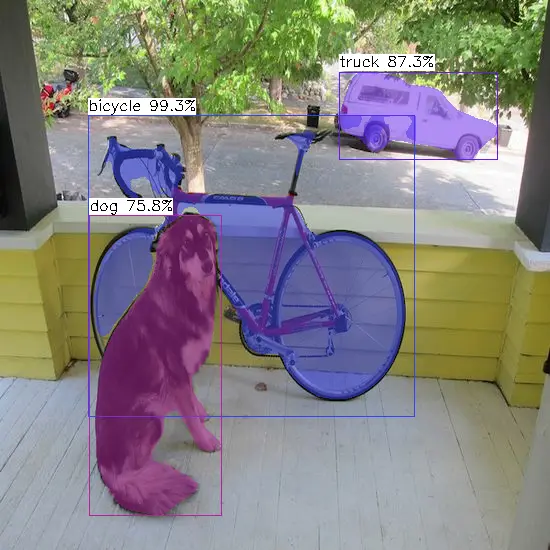Object Segmentation Model: YOLACT
tip
This document demonstrates how to run the YOLACT object segmentation model on Allwinner T527/A733 series chips.
Deploying YOLACT on the board requires two steps:
- Use the ACUITY Toolkit on the PC to convert models from different frameworks into NBG format.
- Use the awnn API on the board to perform inference with the model.
Download the ai-sdk Example Repository
X86 PC / Device
git clone https://github.com/ZIFENG278/ai-sdk.git
YOLACT Inference on the Board
Navigate to the YOLACT example code directory.
Device
cd ai-sdk/examples/yolact
Compile the Example
Device
make AI_SDK_PLATFORM=a733
make install AI_SDK_PLATFORM=a733 INSTALL_PREFIX=./
Parameter explanation:
AI_SDK_PLATFORM: Specify the SoC, options area733,t527.INSTALL_PREFIX: Specify the installation path.
Run the Example
- Set environment variables.
Device
export LD_LIBRARY_PATH=$LD_LIBRARY_PATH:/home/rock/ai-sdk/viplite-tina/lib/aarch64-none-linux-gnu/NPU_VERSION # NPU_SW_VERSION
tip
Specify NPU_SW_VERSION. For A733, choose v2.0; for T527, choose v1.13. Refer to the NPU Version Comparison Table for details.
Navigate to the example installation directory.
Device
cd INSTALL_PREFIX/etc/npu/yolact
# ./yolact nbg_model input_picture
./yolact ./model/yolact.nb ./input_data/dog_550_550.jpg
tip
The example automatically installs the yolact.nb model provided by Radxa. You can manually specify the path to your converted NBG model.
(.venv) rock@radxa-cubie-a7a:~/ai-sdk/examples/yolact/etc/npu/yolact$ ./yolact ./model/yolact.nb ./input_data/dog_550_550.jpg
./yolact nbg input
VIPLite driver software version 2.0.3.2-AW-2024-08-30
viplite init OK.
VIPLite driver version=0x00020003...
VIP cid=0x1000003b, device_count=1
* device[0] core_count=1
awnn_init total: 3.75 ms.
vip_create_network ./model/yolact.nb: 17.04 ms.
input 0 dim 550 550 3 1, data_format=2, name=input/output[0], elements=1833508979, scale=0.018629, zero_point=114
create input buffer 0: 907500
output 0 dim 4 19248 1, data_format=2, name=uid_9_out_0, elements=76992, scale=0.057314, zero_point=142
create output buffer 0: 76992
output 1 dim 81 19248 1, data_format=1, name=uid_8_sub_uid_1_out_0, elements=1559088, none-quant
create output buffer 1: 3118176
output 2 dim 32 19248 1, data_format=1, name=uid_7_out_0, elements=615936, none-quant
create output buffer 2: 1231872
output 3 dim 4 19248, data_format=1, name=uid_6_sub_uid_1_out_0, elements=76992, none-quant
create output buffer 3: 153984
output 4 dim 32 138 138 1, data_format=2, name=uid_239_out_0, elements=609408, scale=0.065950, zero_point=0
create output buffer 4: 609408
memory pool size=15062336 bytes
load_param ./model/yolact.nb: 3.10 ms.
prepare network ./model/yolact.nb: 12.38 ms.
set network io ./model/yolact.nb: 0.01 ms.
awnn_create total: 32.61 ms.
memcpy(0xffff78e62000, 0xffff76df8010, 907500) load_input_data: 0.25 ms.
vip_flush_buffer input: 0.01 ms.
awnn_set_input_buffers total: 0.29 ms.
vip_run_network: 97.06 ms.
vip_flush_buffer output: 0.02 ms.
int8/uint8 76992 memcpy: 0.18 ms.
fp16 memcpy: 7.48 ms.
fp16 memcpy: 1.77 ms.
fp16 memcpy: 0.17 ms.
int8/uint8 609408 memcpy: 0.66 ms.
tensor to fp: 52.01 ms.
awnn_run total: 149.16 ms.
2 = 0.99268 at 88.14 115.14 327.19 x 302.04
8 = 0.87305 at 339.16 71.52 158.58 x 87.82
17 = 0.75830 at 89.21 215.20 132.53 x 301.23
awnn_destroy total: 3.74 ms.
awnn_uninit total: 0.71 ms.

yolact demo result